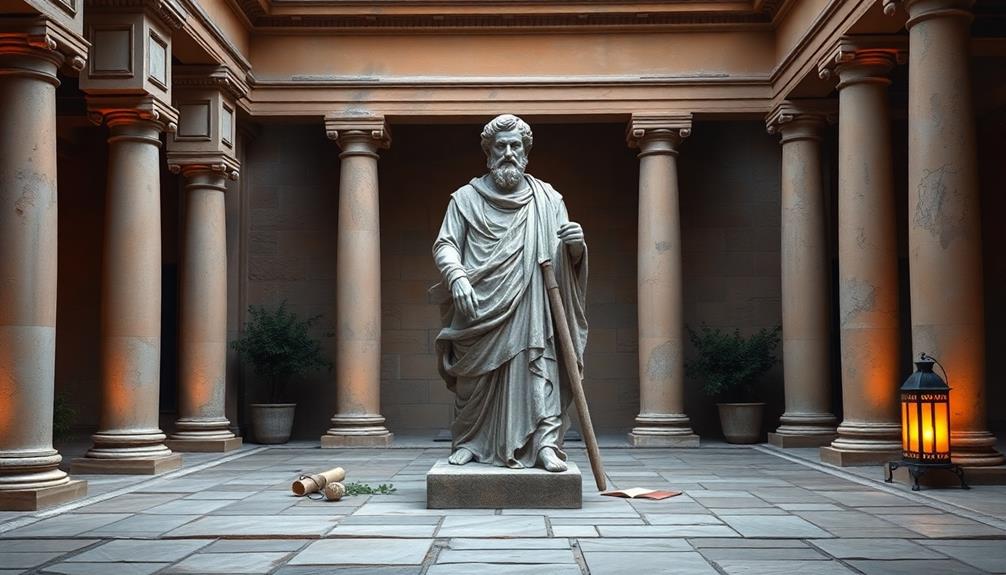Ancient Greek skepticism isn't just a philosophical footnote; it challenges everything you think you know about knowledge. Emerging in the 3rd century B.C.E., key figures like Arcesilaus and Carneades questioned the possibility of certainty and the reliability of sensory perceptions. They advocated for suspending judgment, pushing you to scrutinize widely-held beliefs. You might be surprised to learn that over half of ancient philosophers doubted absolute truths. This skepticism didn't just reshape philosophy—it also impacts modern ethics and critical thinking. Stick around, and you might uncover insights that can reshape your understanding of uncertainty and belief today.
Key Takeaways
- Ancient Greek skepticism emerged in the 3rd century B.C.E., questioning the attainability of certainty in knowledge through two main forms: Academic and Pyrrhonian skepticism.
- Key figures like Arcesilaus and Carneades emphasized suspension of judgment and the unreliability of sensory perceptions, challenging absolute knowledge claims.
- Pyrrhonian skepticism promotes mental tranquility (ataraxia) through refraining from definitive beliefs, encouraging peace amidst conflicting opinions.
- Skepticism reshaped ethical perspectives, advocating for humility and critical reflection, rather than rigid moral absolutes.
- The legacy of ancient skepticism influences modern epistemology and encourages critical thinking about knowledge and belief systems.
Origins of Ancient Greek Skepticism
Ancient Greek skepticism took root in the 3rd century B.C.E., shaped by the philosophical explorations of Pyrrho and the teachings of Plato's Academy. Even though many philosophers sought to claim to know the truth, skeptics questioned whether certainty was ever attainable. This inquiry led to the development of two main forms of skepticism: Academic and Pyrrhonian. The idea of financial accountability mirrors this skepticism, as individuals often need to question their assumptions about wealth and security.
Academic skepticism, influenced by figures like Arcesilaus, argued that true knowledge remains elusive. Arcesilaus critiqued the Stoics, emphasizing that one should suspend judgment rather than assert certainty. His stance created a foundation for future philosophical debate, challenging the very nature of knowledge.
In contrast, Pyrrhonian skepticism, stemming from Pyrrho himself, took a more radical approach by suggesting that you should suspend judgment on all propositions, advocating for a life guided by tranquility rather than dogmatic beliefs.
Later, Carneades further expanded skepticism by introducing the concept of "to pithanon," which suggests using convincing impressions as a practical guide. This approach allows for ethical and epistemological decision-making while maintaining a skeptical outlook.
Through these developments, Ancient Greek skepticism laid the groundwork for ongoing philosophical inquiry and debate about the nature of knowledge.
Key Figures in Academic Skepticism

The development of Academic skepticism prominently features key figures who shaped its philosophical landscape. Among them, Arcesilaus, who led the Academy from around 318 to 243 B.C.E., introduced a pivotal shift by arguing that certainty in knowledge is unattainable. He advocated for suspending judgment on all propositions, highlighting the complexities of human nature in understanding truth.
This approach aligns with the principle that high-quality content boosts credibility and trustworthiness, as skepticism encourages a deeper examination of beliefs and assertions. Following him, Carneades expanded skepticism's reach, introducing the practical criterion known as "to pithanon." This emphasized convincing impressions as a guide for action, marking a significant evolution in skeptical thought.
Both Arcesilaus and Carneades critiqued Stoicism, with Arcesilaus questioning the reliability of sense impressions, while Carneades challenged Stoic views on justice and knowledge.
Arcesilaus revived Socratic methods, drawing out opinions for debate and enhancing dialectical discussions. Carneades' skeptical approach generalized challenges against all predecessors' epistemological theories, questioning the reliability of sense impressions and asserting that this skepticism impacted ethics and practical living.
Contributions of Arcesilaus
Arcesilaus made significant contributions to philosophical thought, particularly by steering the Platonic Academy towards skepticism. He argued that certainty in knowledge is unattainable, a radical shift that reshaped philosophical discourse. His innovative debate techniques involved presenting arguments for both sides of a question, enhancing the dialectical method that you might find engaging.
Here's a quick overview of his key contributions:
| Contribution | Description |
|---|---|
| Shift to Skepticism | Focused the Academy on the idea that absolute certainty is impossible. |
| Debate Techniques | Developed methods to argue both sides, enriching philosophical dialogue. |
| Critique of Stoicism | Challenged Zeno's claim on reliable knowledge from kataleptic impressions. |
| Suspension of Judgment | Advocated for a neutral cognitive state in response to knowledge claims. |
| Revival of Socratic Methods | Emphasized dialogue as essential for exploring differing opinions. |
Arcesilaus' approach encouraged a critical examination of knowledge, promoting a culture of inquiry that resonates even today. His influence can still be felt in modern skepticism and philosophical discussions.
Carneades and Skeptical Thought

Carneades, a significant figure in the development of skepticism, took the reins of the Academy after Arcesilaus and pushed the boundaries of philosophical thought. He challenged established dogmas by engaging in dialectical arguments against Stoic philosophy, effectively reshaping the landscape of skeptical inquiry.
One of his significant contributions was the practical criterion known as "to pithanon," which emphasized the importance of convincing impressions as the foundation for action and ethical judgment. This notion resonates with modern discussions on the validity of knowledge claims, similar to the ongoing debate about copyright vs. trademark differences.
Carneades critiqued the Stoic belief in absolute knowledge and the idea that the sage never errs. He highlighted the limitations of human perception and the unreliability of sense impressions, arguing that our understanding of the world is inherently flawed.
His dialectical strategies not only questioned Stoic views on justice and the divine but also generalized skepticism against all prior epistemological theories. He advocated for suspending judgment on knowledge claims, encouraging a more nuanced approach to understanding.
Ultimately, Carneades' work marked a significant moment in the evolution of skepticism. By balancing theoretical aspects of knowledge with practical implications for everyday decision-making, he raised vital questions about how skepticism interacts with the way we live our lives.
Understanding Pyrrhonian Skepticism

To understand Pyrrhonian skepticism, you'll explore its origins and key principles that challenge the certainty of knowledge.
This approach not only emphasizes the importance of suspending judgment but also highlights its practical implications for achieving tranquility in daily life.
By recognizing the limitations of your beliefs, you can cultivate a mindset rooted in openness and intellectual humility.
Incorporating practices like nighttime meditation can further enhance your ability to maintain mental clarity and reduce anxiety, complementing the principles of skepticism.
Origin of Pyrrhonian Thought
The essence of Pyrrhonian skepticism lies in its radical approach to knowledge and belief. Founded by Pyrrho of Elis around 365 B.C.E, this form of skepticism emphasizes the suspension of judgment, known as epoché, regarding all beliefs.
You'll find that this suspension leads to a state of tranquility, or ataraxia, where one is free from the disturbances of dogmatic views.
Unlike Academic skepticism, which debates knowledge claims, Pyrrhonian skepticism advocates for a complete withholding of assent to any proposition.
Pyrrho's followers, especially Sextus Empiricus, further articulated this thought by highlighting the unreliability of sensory perceptions and the fact that opposing arguments can be constructed for any belief.
This approach fundamentally challenges the notion of absolute truths, suggesting that human understanding is limited and shaped by subjective experiences.
Through its emphasis on critical examination and the rejection of certainty, Pyrrhonian skepticism has profoundly influenced later philosophical movements.
It inspires a modern skepticism that encourages you to question the validity of knowledge claims, reminding you that certainty may often be an illusion.
Key Principles of Skepticism
Understanding Pyrrhonian skepticism reveals several key principles that challenge conventional beliefs about knowledge and certainty. At its core, Pyrrhonian skepticism, founded by Pyrrho, emphasizes the suspension of judgment, or epoché, regarding beliefs and knowledge claims. This approach leads you to a state of mental tranquility, known as ataraxia.
Curiously, much like how astrology claims to influence personality traits and attractiveness, Pyrrhonian skepticism invites a questioning of widely-held beliefs, suggesting that perceived truths may not always align with reality astrological compatibility may enhance attraction.
Unlike Academic skepticism, which debates various positions, Pyrrhonian skepticism takes a more practical stance, avoiding dogmatic assertions altogether. You'll find that Pyrrhonists argue that, since conflicting opinions exist on virtually every matter, refraining from making definitive judgments fosters peace and contentment in life.
The Pyrrhonian method encourages you to practice doubt and question the validity of your sensory perceptions and rational beliefs. This constant inquiry challenges the reliability of human cognition and highlights the limitations inherent in our understanding.
Key figures like Sextus Empiricus further articulated these principles, outlining modes of skepticism that underscore discrepancies in knowledge claims. Ultimately, Pyrrhonian skepticism invites you to embrace uncertainty, helping you navigate a world filled with divergent perspectives while cultivating a sense of calm amidst the chaos.
Practical Implications for Life
Although life is often filled with uncertainties, embracing Pyrrhonian skepticism can lead to a more balanced and peaceful existence. By suspending judgment on all propositions, you can cultivate ataraxia, a state of tranquility that arises from avoiding commitment to potentially false beliefs.
This philosophy encourages individuals to assess their trust creation and net worth carefully, recognizing that the complexities of life can be mirrored in financial matters. When faced with conflicting opinions on various issues, adopting this mindset allows you to accept uncertainty as a natural part of life.
This approach enhances your mental well-being, enabling you to navigate life's complexities without the burden of asserting absolute truths. Instead of seeking definitive answers, you'll learn to rely on convincing impressions to guide your daily actions, making living with uncertainties more manageable.
Recognizing the limitations of human knowledge encourages you to focus on your personal experiences and impressions. This focus fosters an adaptable and resilient mindset, allowing you to confront life's challenges with greater ease.
Ultimately, Pyrrhonian skepticism empowers you to engage with the world more freely, reducing anxiety and promoting a sense of peace amidst the chaos. By embracing this philosophy, you can cultivate a more fulfilling and less stressful life.
The Impact on Ethics and Epistemology

Ancient Greek skepticism challenges you to rethink ethical principles and knowledge claims. By questioning the certainty of what's understood, it urges you to approach moral issues with caution and humility.
This shift not only influences how you view ethics but also prompts a deeper examination of the reliability of your own beliefs. Just as understanding the nuances of BPD vs. Bipolar can lead to more compassionate interactions, embracing skepticism can foster a more thoughtful dialogue on moral dilemmas.
Ethical Implications of Skepticism
Skepticism in ancient Greek thought profoundly reshaped ethical considerations and epistemology. By questioning the reliability of sense perceptions and traditional moral claims, figures like Carneades encouraged a more nuanced approach to ethical behavior.
They didn't just challenge established norms; they opened the door to critical reflection on morality and justice. This process of questioning can be likened to the emotional dysregulation experienced by individuals with Borderline Personality Disorder, which highlights the importance of examining one's beliefs and reactions.
Here's how this skepticism impacted ethics:
- Questioning Certainty: You're prompted to reconsider what you thought you knew about moral truths.
- Flexibility in Ethics: Skepticism teaches you to embrace the complexity of ethical decisions rather than cling to absolutes.
- Search for Convincing Impressions: Carneades' idea of "to pithanon" encourages you to seek reasonable actions that can lead to happiness, despite uncertainty.
- Promoting Ataraxia: The pursuit of tranquility influences you to suspend judgment, fostering a peaceful mind in the face of ethical dilemmas.
Through these insights, skeptics like Arcesilaus illuminated the intricacies of moral thought, urging a reconsideration of rigid ethical claims.
This legacy invites you to navigate ethical landscapes with both caution and curiosity, emphasizing a journey of understanding over dogmatic beliefs.
Epistemological Challenges and Responses
Frequently, the challenges posed by ancient Greek skepticism shook the foundations of epistemology and ethics alike. Figures like Arcesilaus and Carneades emphasized the limitations of knowledge, urging a suspension of judgment on knowledge claims. This skepticism didn't just question what you could know; it also directly impacted your moral beliefs, forcing you to reconsider the basis of your ethical framework. By recognizing the importance of mindset to attract abundance, one can better navigate the uncertainties presented by skepticism, allowing for a more open approach to ethical reasoning.
Carneades introduced the concept of "to pithanon," which stressed that convincing impressions should guide your ethical actions. This approach highlighted how skepticism could influence your decision-making about right conduct. As skeptics critiqued Stoicism, they raised doubts about the reliability of sense impressions, compelling you to reevaluate ethical frameworks rooted in certainty.
The dialectical strategies of Arcesilaus and Carneades exposed weaknesses in dogmatic beliefs, promoting reasoned deliberation over rigid truths. This shift emphasized that moral responsibility and ethical judgments are complex, raising essential questions about assent versus truth.
Consequently, the interplay between skepticism and ethics led to a richer, more nuanced development of ethical theory, prompting you to think critically about your moral convictions in light of epistemological uncertainties.
Cultural Influences on Skepticism

Amid the cultural shifts following Alexander the Great's conquests, ancient Greek philosophy experienced a significant transformation, particularly in the domain of skepticism. The integration of Eastern philosophies brought fresh perspectives, challenging traditional Greek thought.
This era wasn't without turmoil; societal unrest led to the rise of philosophical schools like Epicureanism and Stoicism, which skeptics often critiqued. The influence of diverse perspectives parallels the concept of cultural intelligence (CQ), which emphasizes the importance of adapting to various cultural contexts and can enhance philosophical discourse.
You might feel the weight of these cultural influences, as they shaped skepticism's evolution in profound ways. Consider these key factors:
- Philosophers confronted the chaos of their time, questioning established truths.
- Rising mysticism among the poorer classes spurred existential inquiries.
- Cultural exchanges enriched philosophical discourse, creating a diverse tapestry of ideas.
- Shared assumptions about an external world influenced both Pyrrhonists and Academic skeptics.
As you explore this rich landscape, you'll see how skepticism adapted to address the pressing issues of its day, providing a lens through which to understand knowledge and ethics.
These cultural influences didn't just shape philosophical thought—they echoed the struggles and aspirations of a society in flux.
Lasting Legacy of Skeptical Philosophy

The enduring influence of ancient Greek skepticism has shaped how we approach knowledge and belief today. By questioning knowledge claims, skepticism laid the groundwork for critical thinking and the scientific method. You can trace its impact through the two main branches: Academic and Pyrrhonian skepticism, which continue to inform contemporary debates in epistemology.
Key figures like Arcesilaus and Carneades critiqued Stoic doctrines and developed practical criteria for truth, influencing ethical discussions and the nature of justification. This philosophical legacy also resonates in modern movements like existentialism and pragmatism, which tackle questions of meaning and certainty in our uncertain world.
The emphasis on suspending judgment and recognizing epistemic limitations is particularly relevant today, especially with the rise of digital information. Here's a summary of the lasting legacy of skepticism:
| Skepticism Aspect | Modern Influence |
|---|---|
| Critical Thinking | Scientific Method |
| Academic vs. Pyrrhonian | Contemporary Epistemology |
| Ethical Criteria | Ethical Discussions |
| Meaning and Action | Existentialism & Pragmatism |
| Epistemic Limitations | Information Reliability in Digital Age |
These threads connect ancient philosophy to our current understanding of knowledge.
Frequently Asked Questions
What Is Wrong With Skepticism?
Skepticism's like quicksand; the more you struggle, the deeper you sink. It clouds your judgment, stifles decisions, and may lead you to doubt even the most reliable truths, leaving you lost in uncertainty.
What Did Ancient Skeptics Believe?
Ancient skeptics believed that certainty's unattainable, urging you to suspend judgment on all claims. They questioned sense impressions and emphasized doubt as a path to tranquility, prioritizing practical criteria for guiding reasonable actions in life.
Is Skepticism the Belief That We Cannot Have Knowledge?
Yes, skepticism suggests that certainty in knowledge is elusive. It encourages you to question beliefs and challenge assertions, fostering a mindset that values inquiry over dogma, ultimately leading to a deeper understanding of your own perceptions.
What Is Greek Skepticism?
Imagine standing at the edge of a vast, foggy abyss. Greek skepticism invites you to question what you know, challenging certainty and urging you to examine the limits of understanding and the nature of truth itself.
Conclusion
In the grand tapestry of philosophy, ancient Greek skepticism isn't just a thread; it's the dazzling, vibrant bolt of lightning that shatters the darkness of dogma! You've uncovered the secrets they tried to bury, revealing a world where doubt dances with certainty. Imagine a whirlwind of ideas swirling around, challenging every belief you hold dear. The echoes of these thinkers resonate through time, calling you to question everything and embrace the exhilarating chaos of uncertainty. Immerse yourself!









